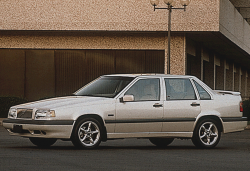— A Volvo class-action lawsuit has been dismissed after the judge ruled the plaintiff who filed the lawsuit didn't prove her case.
According to the lawsuit, plaintiff Ana Webb purchased a used 1997 Volvo 850 in 2009 after seeing advertisements about the car being equipped with solid-steel anti-intrusion bar doors as a safety feature of the Volvo 850.
The lawsuit specifically claims the safety of 1992-1997 Volvo 850 doors was promoted “in advertising, marketing, promotions, sales materials, owner’s manual materials, safety materials, express and implied warranties, and press statements and releases.”
Webb says she bought the car under the belief that it was safe and included solid steel anti-intrusion door bars on all four doors. However, the plaintiff says the 850 had no door bars, something that led to the death of her son.
Her two-month-old son was killed when Ana Webb unfortunately made an unsafe left-hand turn across traffic and into the path of an oncoming Chrysler PT Cruiser that struck the Volvo on the rear passenger-side door where her son was in his car seat.
On May 11th, 2009, her son passed away due to blunt force injuries to his head, allegedly because Volvo lied in its advertisements about the car.
The lawsuit alleges Volvo inserted a "small, flimsy, lightweight, unsupported piece of corrugated plastic into the rear doors" instead of the allegedly advertised steel bars, making the 850 improperly designed and not crashworthy.
According to the plaintiff, the lack of adequate door reinforcement made the boy's injuries worse by allowing the PT Cruiser to penetrate eight inches into the passenger compartment of the Volvo 850.
While the core of the lawsuit is based on Volvo's alleged misleading advertisements, the judge says the original lawsuit never mentioned anything specifically misleading that Webb saw, heard or relied upon to purchase the car.
Attorneys for Volvo pointed out this fact, so the plaintiff filed an amended lawsuit that named just one allegedly misleading advertisement: a Volvo 850 brochure that allegedly advertised the door bars.
However, the judge determined the brochure had been improperly altered by an attorney for the plaintiff. The lawyer (Francis Malofiy) admitted in 2013 he altered a Volvo brochure to make it appear the automaker had advertised the 850 car as being equipped with rear door bars when he in fact used a "Volvo 900 Series" brochure and changed the wording on the image to "Volvo 850."
The judge gave the plaintiff another chance to amend the lawsuit and remove the fake brochure as evidence, something that left Webb again without any specific misleading representations made by Volvo about the car.
Volvo filed a motion to dismiss all counts because the plaintiff could not adequately plead her case.
The automaker said express warranty claims should be dismissed because the warranty had expired long before Webb purchased the used car. In addition, the automaker argued the new car limited warranty applied to the original buyer of the 1997 Volvo 850, not to Mrs. Webb.
Volvo also said negligent misrepresentation and fraud claims should be dismissed because the lawsuit lacked any allegations of "justifiable reliance on any statement or advertising by Volvo."
The judge dismissed the lawsuit with prejudice and said it's clear the allegations made against Volvo fall short of what are legally required. This means Webb won't have the chance to amend the lawsuit again.
"Webb does not at any time allege a single actual representation made by Volvo that she justifiably relied upon. Plaintiffs fail to allege a single example of such advertising or marketing." - Judge Michael M. Baylson
Webb filed a previous lawsuit against Volvo in state court but lost when a jury concluded she was at fault for her son's death by her negligence in causing the crash.
The Volvo class-action lawsuit was filed in the U.S. District Court for the Eastern District of Pennsylvania - Ana Webb, et al., v. Volvo Cars of North America, et al.

